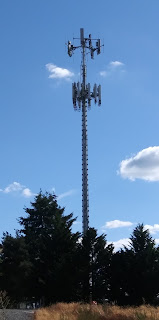At a public meeting on April 25, the Democrat majority on the Federal Communications Commission is expected to adopt new regulations that convert broadband Internet service providers into common carriers akin to public utilities.
I have just one word of advice: “Don’t!”
Oh well, we know that doesn’t work in all instances, foreign or domestic. Not really much drama here. Nevertheless, I am disappointed and baffled that the FCC is determined to pursue such an unwise course, one very likely to be held unlawful.
As Ronald Reagan famously declared in 1980 in the second presidential debate with Jimmy Carter: “There you go again!”

Well, here we go again. I’ve been opposing proposals to apply Analog Age telephone utility regulations to Digital Age broadband Internet service providers (ISPs) for over two decades now. With so many other important issues confronting communications policymakers today, such as closing remaining digital divides in broadband deployment and adoption and ensuring the availability of more mid-band spectrum for private sector use, the FCC’s time and resources would be so much better spent on those matters rather than “net neutrality.”
Regarding the Commission’s proposal, Free State Foundation scholars have filed nearly 100 pages of comments and reply comments with the Commission. These comments treat both the policy and legal issues in a detailed and comprehensive fashion. Additionally, recently we have filed two ex parte submissions for the record, here and here.
I won’t endeavor to even summarize all the extensive arguments in those papers here. Rather, as the Commission vote nears, I offer a few big-picture observations in the nature of “closing thoughts.” Again, each is addressed more comprehensively in our filed papers.
· As I said, I have opposed the imposition of a common carrier regime on broadband ISPs for two decades now. Regardless of whether you agreed with my position in 2004, it is surely the case, in 2024, with the demonstrable increase in facilities-based broadband marketplace competition, coupled with ongoing rapid technological innovation, that the case for imposing common carrier regulation today is considerably weaker than it was even in 2015. That was the last time the FCC voted to regulate ISPs as common carriers.
· This is one of the very rare rulemakings across the administrative state in which substantial burdensome regulatory mandates are proposed without any credible evidence of present harm recited in the proposal. The Commission’s supposed support for the rules is based entirely on a very few old claimed (but disputable) incidents, coupled with plenty of conjecture about what ISPs could or might do, but haven’t done. After the silly dire predictions of utility regulation advocates in 2017 that predicted “the end of the Internet as we know it” and that “you’ll get the Internet one word at a time” – and more – if the common carrier regime was eliminated, there is no justification for according any credibility to predictions now regarding what ISPs might or could do.
· Absent any credible evidence of present harm, and the indisputable record of utility advocates’ wrong-headed predictions of speculative future harms, it is arbitrary and capricious, and inconsistent with any notions of a sound cost-benefit analysis, to risk ongoing investment and innovation by ISPs by virtue of imposition of a utility regulation straight-jacket.
· Unlike the last time the FCC imposed common carrier regulations on ISPs in 2015, the Supreme Court has now embedded the Major Questions Doctrine in its jurisprudence. In short, this means that agencies may not decide questions of extraordinary economic and political significance without a clear congressional authorization for the power it claims. The absence of such a clear congressional authorization here renders the Commission’s forthcoming action very vulnerable as a matter of law – as two former Solicitors General who served under President Barack Obama have written. They contend that classifying ISPs as common carriers without congressional authorization would run afoul of the major questions doctrine.
· In one tell-tale sign of this legal vulnerability, Chief Justice Roberts, in his opinion for the Court in West Virginia v. EPA, quoted from then-Judge Kavanaugh’s dissent on the denial of rehearing in United States Telecom Assn. v. FCC: “We presume that ‘Congress intends to make major policy decisions itself, not leave those decisions to agencies.’” The “major policy decision” to which then-Judge Kavanaugh referred, of course, and which Chief Justice Roberts pointedly highlighted in West Virginia, is whether the FCC possesses authority to impose common carrier regulation on ISPs – the very same question that the FCC is now serving up again to the courts.
· There are many factors, addressed in our comments and in a recent Perspectives from FSF Scholars by my colleague Seth Cooper, supporting the contention that the Commission’s proposal presents a “major question” of extraordinary economic or political significance. One warrants special mention here. I have pointed to Chairwoman Rosenworcel’s public statement, in announcing the FCC’s proposed action, inviting proponents of the common carrier regulation “to make some noise” and “raise a ruckus.” In over 45 years of experience in communications law and administrative law generally, including service as Chair of the ABA’s Section of Administrative Law, a Public Member of the Administrative Conference of the United States, and a Fellow of the National Academy of Public Administration, I am unaware of any other agency head or commissioner inviting advocates to “raise a ruckus” and “make some noise” in an ordinary rulemaking proceeding. Thus, Chairwoman Rosenworcel’s appeal is noteworthy as an indication that she considers the Commission’s action to be of extraordinary economic and political significance, warranting a call to popular action beyond the normal public participation expected in the dozens of ordinary rulemaking proceedings considered in any given year.
All things considered, I’d say, “Don’t!” Or to put a finer point on it, don’t convert Internet service providers into public utilities.












